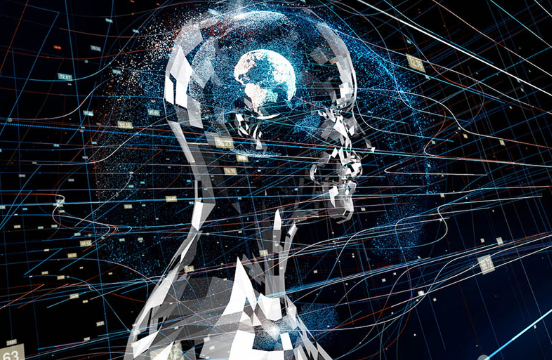
The union of quantum mechanics and man-made reasoning has started an unrest in registering: Quantum AI intelligence. This arising field holds the commitment of upsetting how we approach complex computational assignments, offering unmatched speed and proficiency contrasted with old-style processing strategies.
At its centre, Quantum simulated intelligence bridles the standards of quantum mechanics to improve the capacities of conventional computer-based intelligence calculations. While traditional computer-based intelligence depends on bits as the crucial unit of data, Quantum man-made intelligence influences qubits, which can exist in various states at the same time because of the peculiarity of superposition. This exceptional property empowers quantum PCs to perform huge equal calculations, dramatically expanding their handling power.
The marriage of quantum mechanics and AI opens up a realm of opportunities, from optimizing gadget learning algorithms to fixing complex optimization problems that had been formerly intractable. By leveraging quantum parallelism and entanglement, Quantum AI holds the ability to accelerate breakthroughs in regions consisting of drug discovery, financial modelling, and cryptography.
However, knowing the entire capability of Quantum AI calls for overcoming good-sized challenges. Quantum systems are inherently fragile and vulnerable to errors because of decoherence and noise. Additionally, building and retaining quantum hardware capable of helping AI algorithms is a daunting engineering feat.
Despite those hurdles, the fast development in quantum computing and AI studies is using the improvement of realistic Quantum AI programs. From quantum-stimulated algorithms to hybrid classical-quantum processes, researchers are exploring diverse avenues to harness the power of quantum computing for AI duties.
In this text, we can delve deeper into the intricacies of Quantum AI, exploring its underlying ideas, contemporary advancements, and destiny implications. We will take a look at the blessings of Quantum AI over classical AI, the challenges it faces, and the capacity ethical issues surrounding its improvement. Furthermore, we can explore real-international programs of Quantum AI across industries and discuss the technology and gear driving its implementation.
Join us in this journey into the charming global of Quantum AI, in which the limits of computation are being redefined, and the destiny of artificial intelligence is being fashioned by using the legal guidelines of quantum mechanics.
Quantum AI in Industry: Current Applications and Future Prospects
Quantum AI has began to make its mark throughout various industries, promising transformative solutions to longstanding challenges. In this section, we discover the modern-day landscape of Quantum AI programs and the capacity future effect on industries global.
Drug Discovery:
Pharmaceutical groups are leveraging Quantum AI to boost up the drug discovery process. Quantum algorithms can correctly analyze molecular systems, are expecting drug interactions, and simulate complicated biochemical reactions, notably lowering the time and value related to traditional drug improvement.
Financial Modeling:
In the finance sector, Quantum AI is revolutionizing threat evaluation, portfolio optimization, and fraud detection. Quantum algorithms can method full-size quantities of financial facts with unheard of speed and accuracy, enabling greater knowledgeable investment selections and improving marketplace analysis abilties.
Supply Chain Optimization:
Quantum AI is being hired to optimize delivery chain logistics, from inventory control to course optimization. Quantum algorithms can tackle complicated optimization problems, minimizing prices, decreasing shipping times, and enhancing average efficiency in delivery chain operations.
Energy and Materials Science:
Quantum AI is riding improvements to discover novel materials with proper properties for electricity programs, paving the way for more efficient solar cells, batteries, and catalysts.
Future Prospects:
Artificial General Intelligence (AGI):
Quantum AI holds the capacity to develop the improvement of AGI, machines capable of understanding, learning, and reasoning across various domain names. Quantum computing’s potential to manage massive datasets and carry out complex computations in parallel could lead to widespread breakthroughs in AGI research.
Cybersecurity:
Quantum AI is predicted to play a vital function in strengthening cybersecurity measures. Quantum cryptography gives unbreakable encryption methods primarily based on the principles of quantum mechanics, imparting greater security for touchy records transmission and communication networks.
Climate Modeling and Environmental Science:
Quantum AI can contribute to more accurate climate modelling, environmental monitoring, and natural disaster prediction. Quantum simulations enable researchers to simulate complex environmental systems with unprecedented precision, aiding in climate change mitigation efforts and disaster preparedness.
Healthcare and Personalized Medicine:
Quantum AI can revolutionize healthcare by allowing personalised medication, disease prediction, and genomic analysis. Quantum algorithms can examine genomic statistics with unheard-of pace and accuracy, leading to more effective treatments and personalised healthcare solutions.
As Quantum AI continues to conform, its effect on industries will in all likelihood develop exponentially. While modern programs exhibit the capability of Quantum AI to deal with urgent demanding situations, future possibilities offer glimpses into a world where quantum-powered technology drives innovation, efficiency, and sustainable boom throughout various sectors.
Ethics and Implications of Quantum AI Development
As Quantum AI advances, it brings forth a myriad of ethical concerns and societal implications that warrant cautious examination. In this segment, we delve into the ethical dimensions surrounding the development and deployment of Quantum AI technology.
Ethical Considerations:
Bias and Fairness:
Just as in classical AI, the improvement of Quantum AI algorithms has to deal with troubles of bias and equity. Biases embedded in schooling data or algorithmic layouts ought to perpetuate societal inequalities or lead to discriminatory results. Ensuring fairness and fairness in Quantum AI systems calls for proactive measures to perceive and mitigate biases at every stage of development.
Privacy and Data Security:
Quantum AI introduces novel encryption methods and privateness-improving technology, however it additionally poses new demanding situations to statistics safety. Quantum computer systems have the capacity to interrupt existing cryptographic protocols, raising issues approximately facts privacy and confidentiality. Robust encryption schemes and quantum-resistant cryptographic strategies are vital to safeguarding touchy facts in a quantum-enabled international.
Transparency and Accountability:
Quantum AI algorithms regularly perform as black packing containers, making it difficult to recognize their choice-making techniques. Lack of transparency in AI structures can undermine believe and responsibility, particularly in crucial packages inclusive of healthcare and finance. Promoting transparency and accountability in Quantum AI development includes establishing clean pointers for algorithmic transparency, auditing, and responsibility mechanisms.
Job Displacement and Economic Impact:
The big adoption of Quantum AI technologies may additionally result in job displacement and financial disruption in certain industries. Automation enabled through Quantum AI may want to render a few traditional jobs out of date at the same time as creating new opportunities in rising fields. Addressing the socioeconomic implications of Quantum AI calls for proactive measures to reskill and upskill the workforce, in addition to regulations to make certain equitable distribution of benefits and opportunities.
Societal Implications:
Global Competition and Security:
The race for Quantum AI supremacy has geopolitical implications, as countries vie for management in quantum studies and improvement. The strategic advantage conferred via Quantum AI capabilities extends to country-wide safety, intelligence collecting, and protection programs. International collaboration and cooperation are critical to addressing international challenges and minimizing the risks of geopolitical tensions springing up from quantum generation opposition.
. Environmental Impact:
Quantum computing systems require significant resources and energy consumption, raising concerns about their environmental footprint. As Quantum AI scales up, efforts to mitigate its environmental impact become increasingly important. Research into energy-efficient quantum computing architectures, as well as sustainable practices in hardware manufacturing and operation, can help minimize the carbon footprint of Quantum AI technologies.
Conclusion
In end, the emergence of Quantum AI represents a paradigm shift in computing, imparting incredible possibilities for innovation and improvement at some stage in various industries. However, as we adventure into this new frontier, it’s miles imperative to navigate the ethical and societal implications with warning and foresight.
Ethical concerns surrounding bias, privacy, transparency, and responsibility underscore the importance of responsible AI improvement practices. Addressing the ones worries requires collaboration amongst stakeholders, inclusive of researchers, policymakers, employer leaders, and ethicists, to make certain that Quantum AI era serve the not unusual pinnacle and uphold critical human values.
Furthermore, the societal implications of Quantum AI extend beyond technical problems, encompassing geopolitical opposition, environmental sustainability, and socioeconomic fairness. By fostering worldwide collaboration, promoting environmental stewardship, and prioritizing inclusive growth, we will harness the transformative capability of Quantum AI on the same time as mitigating its risks and maximizing its blessings for humanity.



